MIND Your Diet for Better Brain Health
Some people follow a specific diet to lose weight, while others follow a diet to lower blood pressure or improve heart health. However, there’s one diet that has the potential to provide all those benefits plus delay or reduce the onset of cognitive decline: The MIND diet.
The MIND diet is a dietary program specifically designed for Neurodegenerative delay. This was formed by blending 2 highly effective diets: the Mediterranean and Dietary Approaches to Stop Hypertension (DASH) diet.
The Mediterranean diet mainly focuses on a heart-healthy eating plan. The DASH diet aims to treat or prevent high blood pressure.
The MIND diet is different because it is designed to target brain health and reduce the risk of some neurological diseases such as dementia. The MIND diet encourages the consumption of a variety of foods that ultimately benefit both the nervous system and cognitive health.
At Aviv Clinics Dubai by DP World, our clinical team includes dietetic support for every client due to the important role of nutrition when it comes to cognitive and neurological health.

Essentials for the Brain
For optimal health, your brain needs specific nutrients such as
- Omega-3 fatty acids for strengthening brain cell structure
- Choline to help regulate memory, mood, and cognitive performance
- Flavonoids for regulating inflammation and improving blood flow
- Vitamin E for protection against inflammation
The MIND diet provides all of the above mentioned essential nutrients. The diet omits or limits foods with ingredients that could negatively impact the brain, like saturated fats and trans fats, which are believed to be responsible for increasing beta-amyloid protein levels in the brain. This protein accumulates in the brain and can disrupt communication between brain cells and ultimately lead to brain cell death.
Eating foods that contain these unhealthy fats have been associated with an increased risk of Alzheimer’s disease. Examples of foods containing unhealthy fats are red meats, processed foods, and fried foods.
Foods containing antioxidants and vitamins—like what’s suggested as part of the MIND diet—may prevent the formation of these beta-amyloid plaques in the brain. Plant-based foods also contain phytonutrients and antioxidants which is beneficial for overall health.
More than half of your brain is made up of omega-3 fats. Your body needs foods rich in omega-3 fats to provide the necessary protective anti-inflammatory benefits. Omega-3 foods includes
Healthy fats, known as polyunsaturated fats, found in fish oils, flax seed, walnuts, and cold-water fish for example, and monounsaturated fats, which have anti-inflammatory properties, obtained from eating avocado, nuts, and seeds, all provide the essential omega-3 fatty acids that are beneficial for optimal brain health.

How to Make the MIND Diet Work for You
The MIND diet encourages a diversity of healthy foods designed to deliver a multitude of brain health benefits. It includes foods rich in phytonutrients, vitamins, and antioxidants such as:
- Leafy Greens and Vegetables: eat at least 1 serving of leafy greens e.g. spinach every day.
- Berries: they are particularly emphasized in the MIND Diet due to their potential cognitive benefits. Aim for at least 2-3 servings weekly.
- Nuts: vary the type of nuts you eat to gain the most benefit. One serving of nuts equates to one handful or roughly 30 grams.
- Olive oil and olives
- Whole grain: Oatmeal, quinoa, brown rice, whole-wheat pasta, and 100% whole-wheat bread.
- Fish: Choose fatty fish like salmon, sardines, trout, tuna, and mackerel for their high amounts of omega-3 fatty acids. Aim to have oily fish once weekly and white fish once weekly.
- Beans, lentils and soybeans.
- Poultry: chicken, turkey.
- Stay hydrated.
Other tips include cooking at home to have better control over the ingredients and cooking methods. Also, be mindful of your portion sizes and create a meal plan to make it easier to adhere to the diet.
Foods to Limit or Avoid
- Butter and margarine: limit your intake to less than one tablespoon daily.
- Cheese: if you have cheese, the best options are the white cheeses such as feta/Greek cheese, halloumi, cottage cheese.
- Red meat: aim for no more than two servings each week.
- Fried food: the MIND diet highly discourages fried food, especially from fast-food restaurants. Limit consumption to a maximum of once weekly.
- Pastries and sweets: limit your intake to a couple of times a week.

The Bottom Line
Researchers are learning more and more about the link between cognition and the MIND diet. Please keep in mind, the MIND Diet is not a guarantee against cognitive decline or neurodegenerative diseases, but it may help reduce your risk and promote overall health. As you age and the risk of developing memory disorders like dementia increase, laying a firm foundation for healthier eating will become vital to maintaining quality of life.
As leaders in brain performance, the expert clinicians at Aviv Clinics Dubai help keep your mind and body healthy for years to come. With hyperbaric oxygen therapy (HBOT) at its core, cognitive and physical training, and nutrition coaching, the ground-breaking Aviv Medical Program enhances cognitive and physical function and triggers the body’s natural capabilities at self-regeneration.
Contact us for a free consultation and learn about how our nutritional coaching will enhance the benefits of the Aviv Medical Program.
Intermittent Fasting 101
Intermittent fasting has been on an increasing number of peoples’ radars over the past 5 to 10 years. Yet, it’s not a “new” concept. In prehistoric times, fasting was just a part of daily life. As hunters and gatherers, our ancestors went days without nourishment.
The documentation of intermittent fasting dates back to the 1500s, recorded by Luigi Cornaro, a nobleman. Cornaro made significant changes to his diet and lifestyle habits in his 40s to strengthen his “weak constitution.”
At age 83, his colleagues urged him to chronicle these changes—because they had known him as a younger man and were certain Cornaro should not still be living. He continued to beat the perceived odds and lived another 20 years, dying at age 103.
Fast forward to 2019, when the New England Journal of Medicine published a peer-reviewed paper on the health benefits of intermittent fasting. Intermittent fasting remains a viable approach to living longer, healthier lives.

How Does Intermittent Fasting Work?
The human body operates with one goal in mind: survival. If you go 8-12 hours without food, your entire body is out of gasoline. You have no more stored glycogen, which provides energy. Your liver and muscle cells are empty, and your brain is screaming for sustenance. As a result, your body taps into what’s easiest to access in order to feed the brain: visceral fat.
It’s important to note that not all fat stored in the body is “bad.” Humans need certain types of fat to promote healthy metabolism and optimal hormone levels.
Visceral fat is not that type. High visceral fat levels may contribute to diabetes, heart disease, stroke, artery disease, and even cancer. So, reducing those levels is not just about eliminating a spare tire or muffin top.
Scientific Benefits of Intermittent Fasting
The research on intermittent fasting reveals its impact beyond weight loss. Thirteen hours without ingesting calories prevents breast cancer in both women and men. In rats, a 14-16 hour fasting period improves longevity by 30-50%.
Additional benefits include improvements to:
- thinking and memory
- blood pressure
- physical performance
- type-2 diabetes
- sleep apnea
Intermittent fasting also helps with reducing inflammation.
Too much inflammation in the body can lead to conditions such as:
- Alzheimer’s disease
- arthritis
- asthma
- multiple sclerosis
- stroke

The Simplest Diet: Intermittent Fasting
Aside from the health benefits, one of the best aspects of intermittent fasting is that it doesn’t require people to invest any extra time or money. You don’t have to buy special foods or spend hours measuring and weighing your meals. There are also no “off-limit” foods. You can still enjoy your favorite meals and snacks as long as you do so in moderation.
All intermittent fasting requires is knowing what time it is.
And, in truth, we all fast—it’s called sleeping!
The goal is getting to the sweet spot, the thirteen-hour marker of fasting, where the medical benefits take hold. However, there’s no detriment to switching up your schedule. Some days you may hit 13 hours, other days, you might aim for 16 or 18. A popular intermittent fasting schedule is 16:8—fasting for 16 hours and feasting for eight. On the weekends, you may decide not to stick to a schedule. Consistently practicing intermittent fasting is most important.
That said, there is some risk in fasting for too long. For example, if you’re regularly hitting the 20-hour mark, you’ll likely start to lose muscle mass. The body can only absorb 30 grams of protein at a time. With a limited feast window, you may not be getting adequate protein intake.
Are There Any Risks Associated with Intermittent Fasting?
Individuals living with diabetes should consult with their endocrinologist or diabetes educator before commencing with intermittent fasting. However, if someone is only in the stage of insulin resistance, intermittent fasting can prevent diabetes from developing.
Some people report experiencing digestive issues, such as constipation. In this case, they’re likely not drinking adequate amounts of water or eating enough high-fiber foods. Of course, in the initial stages, one might experience some fatigue, hunger pangs, and possibly headaches. As with any lifestyle change, it takes persistence and time to adapt. Still, it’s critical to have a conversation with your healthcare provider if you’re curious about intermittent fasting’s effects.
Ready to Explore Intermittent Fasting?
Different types of intermittent fasting exist. Some of the most common include:
Time-Restricted Fasting. This approach works by limiting the daily window of feasting. For example, if you eat your first meal of the day at 10 a.m. and your last meal at 6 p.m., you’ve followed the 16:8 plan. Common ratios for time-restricted fasting include 14:10, 16:8, and 18:6.
5:2 fasting. In this strategy, individuals eat “normally” five days a week and fast for two days. On the fasting days, they restrict their calorie intake to one 500-calorie meal for women and one 600-calorie meal for men.
Alternate Day Fasting. Using the same calorie intake as 5:2, fasting takes place every other day.
Time-restricted fasting is a great way to start because you can ease into it—gradually shrinking your feast window. As you get more accustomed to fasting, you might venture into other methods to see if they work for you.
Bottom Line
The benefits of intermittent fasting are well-documented. Whether you’re looking to lose weight, improve your daily performance, optimize your cognitive health, or generally extend your lifespan, intermittent fasting is effective.
Nutrition is a core component of the Aviv Medical Program. If you’d like to learn how the program works and its benefits, contact us for more information.
The Effect of Coffee on Brain Health
Pour-over, solo, drip, French-pressed – however you enjoy your coffee, it may be doing more for you than just getting you going in the morning. Drinking coffee may also protect you from a variety of health conditions, so long as it is consumed in moderation.
For decades, coffee had a poor reputation because of early studies that deemed it a carcinogen and linked it to an increased risk for heart disease. Recent research now suggests that drinking coffee, including decaffeinated coffee, may actually provide a variety of health benefits when consumed in moderation.
The Benefits of Coffee on Brain Health
Some of coffee’s health benefits are commonly known, including that it boosts metabolism and increases energy levels. Lesser known, but perhaps more important benefits of coffee are that it also:
- Enhances brain function
- Lowers the risk of developing dementia and Alzheimer’s disease
- Decreases the risk of stroke and depression.
Beyond brain health, moderate consumption of coffee also helps reduce the risk of some cancers, type 2 diabetes, and heart disease.
Coffee’s Key Ingredients
Caffeine is just one of about 1,000 chemicals found in coffee beans, but is the best known. A stimulant, caffeine delivers a boost of energy and helps provide focus. It locks into the adenosine receptors in the brain, which cause drowsiness, and counteracts the sleepiness response by blocking the function of the receptors. Instead of feeling drowsy, caffeine stimulates the brain’s production of norepinephrine and dopamine, which is what leads to increased focus and alertness.
In addition to caffeine, coffee also contains beneficial polyphenols and antioxidants, which fight inflammation and protect against some diseases.
Polyphenols are organic compounds found in the coffee plant. They contain anti-inflammatory properties that have the potential to prevent or reduce the risk of certain cancers and other chronic health conditions. Some polyphenols may also protect against neurodegenerative diseases, including Alzheimer’s, Parkinson’s, and Huntington’s. Consuming polyphenols also may help regulate metabolism, weight, and cell production.
Other beneficial components in coffee include vitamin B2 (riboflavin); vitamin B5 (pantothenic acid); vitamin B1 (thiamine); vitamin B3 (niacin); folate, manganese, potassium, magnesium; and phosphorus.
Coffee beans also are enriched so that when they are ground, blended, and consumed, provide some pre- and probiotic properties for good gut health.

The Cons of Drinking Coffee
While coffee has many health benefits, it can also have some negative effects. For example, it can:
- Disrupt sleep
- Cause anxiety and jitteriness
- Lead to an addiction to caffeine
- Cause withdrawal symptoms (headache, fatigue, brain fog, and irritability) when abstaining
- Increase feelings of anxiety and agitation in those with anxiety disorders
Moderating consumption is key to enjoying its benefits.
How Much Coffee Should You Drink?
As with most foods, coffee is a healthy beverage when consumed in moderation. The Dietary Guidelines for Americans recommends no more than five cups a day or on average 400 mg of caffeine. Another reason for moderate consumption is because too much, especially after mid-day, could interfere with getting a good night’s sleep and may create feelings of anxiety.
Optimizing the Benefits of Coffee
While coffee has many health benefits, adding refined sugar, artificial sweeteners, and/or creamers add calories and create an unhealthy beverage.
“The extra calories, sugar, and saturated fat in a coffee house beverage loaded with whipped cream and flavored syrup might offset any health benefits found in a basic black coffee.” – Harvard School of Public Health

How you brew your coffee also affects the health benefits it imparts.
For example, using a paper filter or checking coffee pods for built-in filters helps prevent the passage of unhealthy chemicals present in coffee as it filters. Some of these chemicals can raise levels of LDL, or the “bad” cholesterol.
The Bottom Line
Coffee has many health benefits, when drunk in moderation. Using high quality beans, brewing it with a paper filter, and limiting additions such as refined sugars and creamers, can optimize the impact of coffee on your brain health.
Aviv Clinics Dubai – brought to you by DP World delivers a highly effective, science-based treatment protocol to enhance overall brain performance, extend healthspan, and improve the cognitive and physical symptoms of conditions such as mild cognitive decline, fibromyalgia, and Lyme disease. The Aviv Medical Program’s intensive treatment protocol uses hyperbaric oxygen therapy and includes nutrition management and dietitian support to optimize your diet for better brain health. Based on over a decade of research and development, the Aviv Medical Program is comprehensive and customized to your needs.
Contact us to learn more.
Surprising Ways Mixed Nuts Can Benefit Your Health
Exploring the Powerful Benefits of Nuts for Your Cognitive and Overall Health
For a nutrient-dense snack that contributes to weight management, while also providing advantages for heart and brain health, consider incorporating a daily portion of assorted nuts into your eating routine.
Nuts and seeds are a nutritional powerhouse, boasting low carbohydrate content and an abundance of fiber, protein, antioxidants, crucial vitamins and minerals, as well as an assortment of beneficial phytochemicals. Research suggests that including nuts and seeds in your diet could potentially diminish the likelihood of various conditions such as elevated blood pressure, heightened cholesterol levels, and inflammation, which are linked to the development of ailments like heart disease, diabetes, cancer, and stroke.
Nutritional profile of mixed nuts
While nuts and seeds are packed with essential nutrients that can enhance a balanced diet, it’s advisable to consume them in moderation due to their elevated fat and calorie content. It’s important to note that the fats found in nuts and seeds are primarily of the unsaturated variety, including beneficial omega-3 fatty acids that promote heart health. Nonetheless, like any indulgence, overconsumption can undermine your efforts to opt for healthier, low-fat, and low-calorie snack choices.
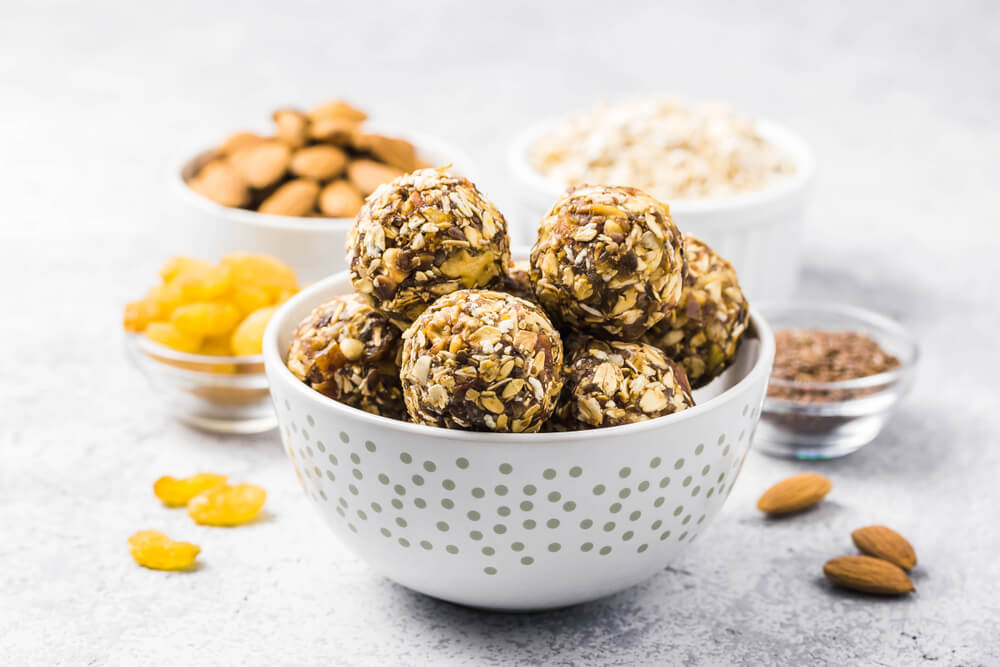
What makes nuts and seeds so beneficial?
Nuts and seeds are considered superfoods, offering a multitude of health benefits even in small quantities.
Here are some advantages:
- Positive impact on Lipid Profile: consuming nuts in moderation is unlikely to adversely affect your lipid panel. In fact, research suggests that they may contribute to reduced bad cholesterol levels.
- Source of Phytosterols: Nuts and seeds also include sources of phytosterols, a substance that holds potential in cholesterol reduction. These naturally occurring sterols contribute to the health benefits of these foods.
- Rich Source of Omega-3 Fatty Acids: While commonly associated with fish, omega-3 fatty acids are also prevalent in nuts. These essential nutrients play a role in maintaining the structural integrity of cell walls throughout the body. Maintaining a balanced intake of omega-3 fatty acids is also crucial for preventing potential imbalance linked to neurodevelopmental disorders.
- Rich in Dietary Fiber: Nuts and seeds offer a significant source of dietary fiber, which plays a key role in regulating the immune system, combating inflammation, and promoting regular bowel function. This fiber content is particularly beneficial for maintaining gut health. For individuals aged 50 and above, the Institute of Medicine recommends a daily intake of 25 grams for women and 30 grams for men. A mere handful of nuts supplies nearly four grams of fiber. A diet high in fiber can also support the growth of beneficial gut microbes, which play a role in producing short chain fatty acids, which is important for gut health and can potentially influence brain health through various pathways.
- Rich in Vitamin E and L-arginine: Vitamin E, present in substantial amounts in nuts and seeds, contributes to the prevention of arterial plaque formation. This plaque buildup, if unchecked, can lead to conditions like heart disease, angina, and cardiac arrest. Additionally, L-arginine, a component found in these foods, aids in enhancing blood flow by increasing the flexibility of artery walls and reducing the likelihood of blockages.
- Good source of protein: Nuts and seeds encompass varying levels of protein content, making it beneficial to consume a diverse range. Protein is essential for cellular repair and regeneration. For optimal intake, protein should constitute approximately 10 to 35% of your daily calorie consumption. This equates to around a minimum of 50 grams of protein per day for adults.
- Antioxidant Powerhouses: Within nuts and seeds lie a rich reserve of antioxidant vitamins and phenolic compounds. These compounds play a role in reducing inflammation and alleviating oxidative stress. Oxidative stress triggers an internal imbalance, allowing an excess of free radicals within the body’s cells. Research shows that by neutralizing these free radicals, nuts and seeds have demonstrated the ability to effectively mitigate oxidative stress, thereby promoting overall health and reducing the undesirable effects of aging.
- Other possible benefits to include:
- Support the production of neurotransmitters, such as dopamine and serotonin, which regulate mood and behavior. Thus, reducing the risk of depression and anxiety.
- Boost energy levels and combat fatigue, which can positively impact cognitive performance.
- Nuts have a low glycaemic index and can help regulate blood sugar levels. Stable blood sugar levels are important for brain health and reducing the risk of cognitive decline.
While nuts can be a beneficial component of a brain-healthy diet, it’s important to adopt a comprehensive approach to brain health that includes a well-balanced diet rich in a variety of nutrient-dense foods, regular physical activity, adequate sleep, stress management, and cognitive engagement.
How often should nuts and seeds be eaten?
As mentioned above, nuts and seeds are calorie-dense, so portion control is key. A standard serving size is about 1 ounce (28 grams) per day, which is roughly a small handful. This provides nutritional benefits without excessive calories. Substitute between different types of nuts and seeds to ensure you are getting a broad spectrum of nutrients.
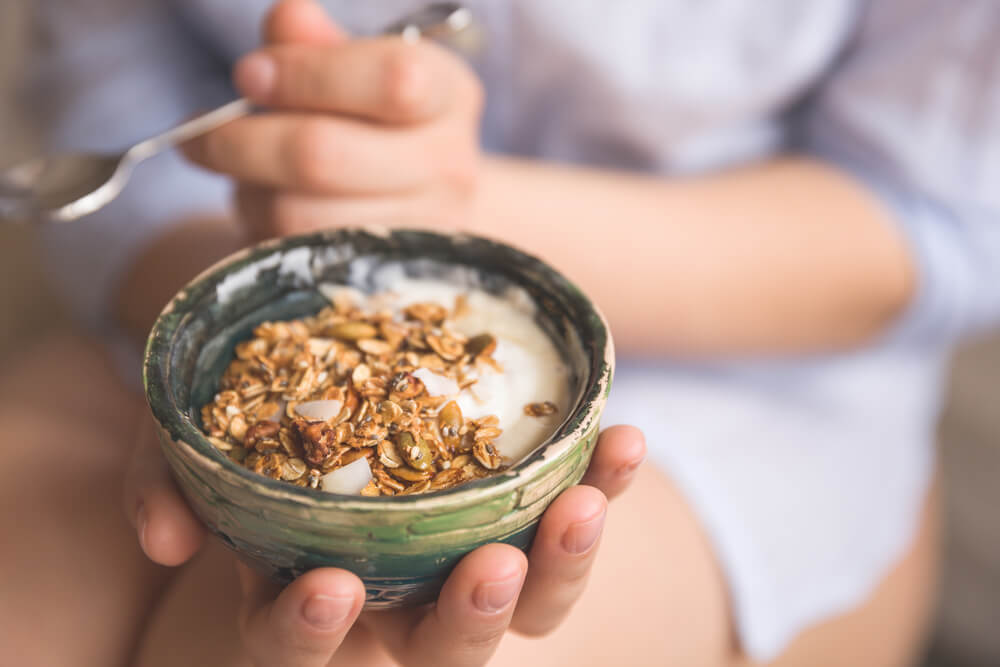
How to incorporate them into your diet
- Add pumpkin seeds to salads, oatmeal, rice, sweet potatoes, and quinoa for added flavor, fiber, and texture.
- Incorporate nuts and seeds—such as pine nuts, sunflower seeds, chia seeds, and pumpkin seeds—into smoothies. These choices are excellent sources of protein, fiber, and omega-3 nutrients.
- Create your own trail mix by blending nuts and seeds, and then adding the mix to yogurt or enjoying a handful as a snack.
- Nutty Pesto: Blend nuts like pine nuts or walnuts into homemade pesto to serve over pasta, grilled vegetables, or as a dip.
- Stir-Fries: Sprinkle seeds (e.g., sesame or pumpkin seeds) over stir-fried dishes to add a nutty crunch.
- Baked Chicken or Fish: Use crushed nuts or seeds as a coating for baked chicken or fish, adding a flavorful and nutritious crust.
- Fruit Parfaits: Layer yogurt, fruits, and a sprinkle of chopped nuts or seeds to create a nutritious and indulgent dessert.
- Nutty Bites: Create small energy bites by combining nuts, seeds, dried fruits, dates, and honey. Roll them into bite-sized balls for a sweet treat.
- Frozen Yogurt Bark: Mix chopped nuts and seeds into Greek yogurt, spread it onto a baking sheet, and freeze for a delicious frozen dessert.
In the pursuit of optimal brain health, nutrition plays a crucial role.
Nutrition stands as a core component within the Aviv Clinics Dubai by DP World Medical Program. Building the right nutrition plan involves a comprehensive analysis, taking into account your dietary intake, habitual behaviors, personal preferences, existing health conditions, and aspirations. The outcome is a personalized roadmap intended to provide your brain and body with the precise combination of nutrients and energy necessary for the rejuvenation process.
Our approach is built upon a comprehensive assessment of your dietary intake, habits, preferences, health conditions, and individual objectives. Throughout the Program, your dedicated dietitian closely monitors your nutritional consumption to ensure that you are deriving the maximum benefits as you make progress.
If you’re interested in understanding how our program operates and its advantages, Contact the clinic to learn more.
Does High Blood Pressure Cause Memory Loss?
We all know that high blood pressure can cause a host of other health issues, although most of us are unaware that high blood pressure can cause memory loss. Cognitive decline is a side effect that isn’t always discussed. But having high blood pressure can directly affect your cognitive function, causing problems like brain fog and forgetfulness, as well as severe cognitive issues like vascular dementia.
Nearly one in three Americans and two-thirds of adults age 60 and older have high blood pressure, making it one of the most notorious killers in the United States. Fortunately, there are actionable steps you can take to manage your blood pressure, no matter your age.
Treatment options, such as the research-based hyperbaric oxygen therapy (HBOT) protocol available at Aviv Clinics, target associated health challenges like post-stroke, and age-related cognitive decline. Keep reading to learn more about how high blood pressure can cause memory loss, plus what you can do.

What Is High Blood Pressure?
Also called hypertension, high blood pressure occurs when the force of the blood pushing against the walls of your blood vessels is too high.
Every blood vessel in your body requires a certain amount of pressure to stay intact. High blood pressure may damage arteries, making them less elastic. Lower elasticity slows blood and oxygen flow to vital areas of the body. Health problems happen when your blood pressure wanders outside the acceptable range.
The higher your blood pressure, the greater your risk for health problems like heart disease, heart attack, and stroke. It also increases your risk of cognitive problems later in life.
What’s An Acceptable Blood Pressure?
Normal blood pressure levels differ for every person and depend on age, weight, and other factors. According to the American College of Cardiology and the American Heart Association:
- Stage 1 hypertension occurs at 130/80 mm Hg
- Stage 2 hypertension occurs at or above 140/90 mm
High blood pressure is unique because it doesn’t present symptoms on its own. The only way most people even discover that their blood pressure is high is when something more serious happens, like a clot. The best way to learn whether your blood pressure is at a healthy level is to measure it with a blood pressure machine at a doctor’s office, pharmacy, or on a home blood pressure machine.
Tip: A home blood pressure device is a worthwhile investment to monitor your health. Take your measurements at the same time every day for consistency, as your blood pressure will naturally rise and fall during the day.

How Exactly Does High Blood Pressure Impact Memory Loss?
The brain receives roughly 20–25% of the body’s blood supply. When high blood pressure causes the supply to decline, the brain lacks the nutrition needed to perform at optimal levels.
High blood pressure can also harm the tiny arteries that feed “white matter,” or the wire-like cells that transfer information to different brain areas. These issues may manifest with memory problems, confusion, lack of concentration, and other side effects.
Research Studies
Age-related cognitive decline studies show having high blood pressure during midlife can affect cognition later in life. We’ll let these research studies help clear the fog on the link between the brain and blood pressure:
- In this study, men at an average age of 78 years logged their blood pressure. After adjusting for biases like prior education and age, the men who performed the most poorly on the test were those who had experienced high blood pressure in middle age. This suggests a direct connection between hypertension and cognitive decline later in life.
- More recent studies have helped to reaffirm the connection between hypertension and cognitive decline. Researchers found mental processing speed and executive function were the top two cognitive skills most affected later in life.
Vascular Dementia
High blood pressure directly increases the risk of developing vascular dementia—a type of dementia caused by blood flow problems in the brain from strained blood vessels. The strain on the blood vessels makes it difficult for the brain to get the oxygen needed to function correctly.
Fortunately, vascular dementia symptoms can be improved through hyperbaric oxygen therapy (HBOT), such as the type available at Aviv Clinics in central Florida. HBOT works by delivering oxygen directly to the brain in a pressurized environment. The direct supply of oxygen allows the damaged blood vessels in your brain to heal, helping you regain some cognitive functions.
How Can You Manage High Blood Pressure?
While medication is often the first thing people think of, investing in your health via lifestyle choices and research-backed therapies is really the best medicine for managing high blood pressure.
The absolute best things you can do for your high blood pressure and brain health are the following:
- Eat a clean diet of whole foods to promote your gut health.
- Exercise to help maintain or manage your weight.
- Get enough sleep by establishing a bedtime routine, working up a sweat, and turning off the TV.
- Engage your mind by gardening, reading, or even playing a video game with your kids or grandkids.
- Reduce and manage your stress levels with activities like yoga or meditation. Practicing mindfulness meditation can help you stay grounded in the present moment and reduce stress.
- Seek unique and comprehensive therapies, such as hyperbaric oxygen therapy (HBOT). Research-backed HBOT programs, such as the one offered as part of the Aviv Medical Program, encourage damaged vessels to heal and cognitive functions to improve.
Aviv’s unique protocol may include HBOT, along with cognitive training, dietary coaching, and physical performance training. This holistic approach has been key to restoring our patients’ optimal health.
Find Hope and Healing with Aviv
While high blood pressure is dangerous, especially later in life, it is possible to manage it. It’s never too late to start, even after a cognitive decline diagnosis.
If you’d like more guidance, reach out to the Aviv Clinics team.
How Does Sugar Affect the Brain?
From the Paleo diet to the Mediterranean diet to the ketogenic diet and beyond, there’s one thing that nearly all modern diets agree on—if you want to maintain a healthy body and mind, cut out sugar.
While there’s wisdom in this advice, blanket statements like “cut out sugar” can leave room for confusion. It leaves many people wondering, is all sugar bad for you? Should you avoid sugar in any form, including in fruits? What about carbohydrates found in vegetables like potatoes? With so many complicated questions like these and no clear answers, it’s no wonder many people feel confused. As a center dedicated to improving brain health and performance, Aviv Clinics understands the importance of proper nutrition and its direct effect on cognitive and physical functioning.
Let’s examine sugar in detail and clarify what dietitians really mean when they tell you to cut out sugar.
Is Sugar Really the Enemy?
Not exactly—foods with high amounts of sugar can still be healthy! For example:
- Apples contain lots of sugar but water, vitamins, nutrients, and dietary fibers that are vital for a healthy body. Dietary fiber is essential for maintaining a thriving wealth of gut flora. Gut flora builds our immune system and fights off ailments like leaky gut disease.
- You can find natural sugars in many whole foods. They also come in many different chemical forms, including glucose from carbohydrates. Glucose provides our bodies with energy, helping fuel our muscles and vital organs as it circulates throughout the bloodstream. We wouldn’t be able to function normally without the glucose from carbohydrates.
Does Your Brain Need Sugar?
Although the brain can use alternative fuel sources for fuel if you’re insulin resistant, such as ketones, glucose is the brain’s preferred fuel source. The brain relies heavily on glucose when performing complex tasks requiring much thought.
So when you’re concentrating extra hard on a crossword puzzle or a complicated passage in your favorite book, your brain is burning glucose over time to help you get the job done. If your blood sugar dips too low, you can experience problems like brain fog or trouble concentrating. It’s your brain’s way of telling you that it needs more fuel and that you should grab a healthy snack.
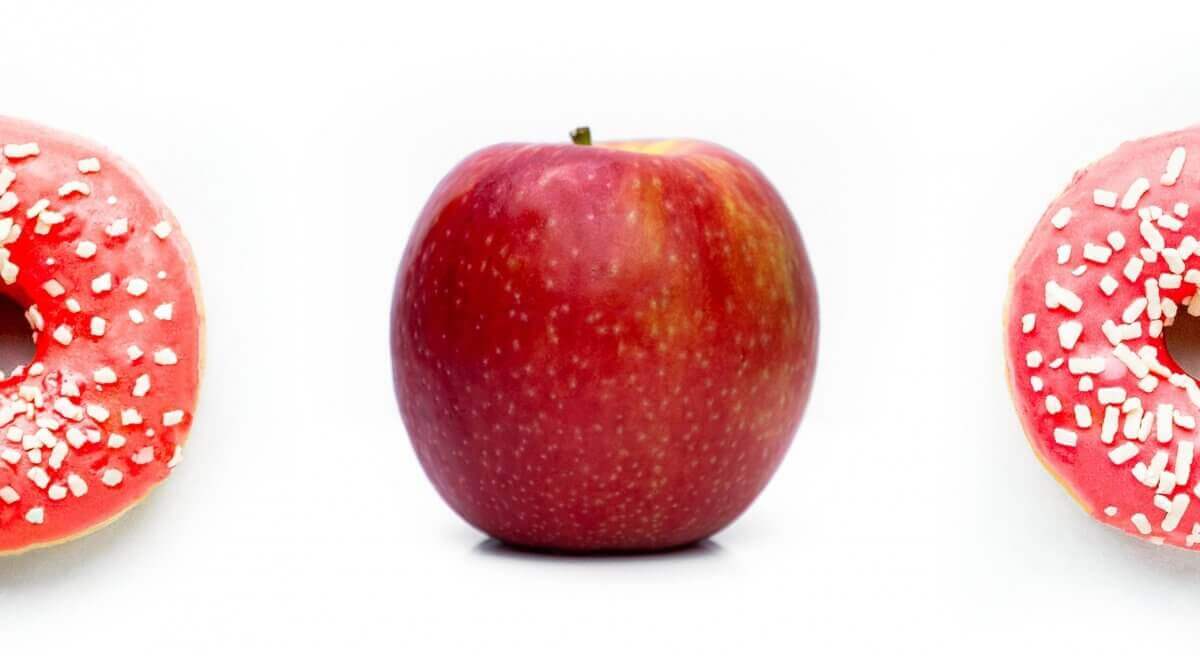
What Is the Difference between Natural Sugar and Refined Sugar?
While natural sugar naturally occurs in foods, refined sugar is processed to extract the sugar.
Natural Sugar Process
When you eat an apple, your body does all the work of processing the unrefined fruit into digestible nutrients all on its own.
First, you must chew the apple, breaking it down into apple sauce. Then, your gut does the hard work of absorbing the vital nutrients and breaking down the sugar to send circulating throughout your bloodstream.
The leftover fiber is used to nourish your gut’s network of microflora. When you eat whole foods, your body is the factory, and the natural sugars in your foods are the fuel that runs it.
Refined Sugar Process
Foods with refined sugar are a different story. Candies, cookies, chips, and other pre-packaged snacks don’t offer your body the same fuel as whole foods. Your body doesn’t have to go through the work of breaking down these highly processed foods—the factory already did it for you.
Processed foods are loaded with refined sugar without any of the nutrients, vitamins, and fibers your body needs. This leaves your gut flora starved of the materials required to function and your immune system vulnerable.
Is Sugar Bad for Your Brain?
It’s possible to have too much of a good thing. Modern western diets are filled with refined sugar and carbohydrates in the form of ready-made snacks, treats, and processed foods.
Thus, you may feel sluggish once the “sugar high” wears off. Eating too much sugar can also make you susceptible to health conditions like type 2 diabetes.
The best way to limit refined sugar intake is to lean on a natural diet consisting of whole foods.
What Does Sugar Do to Your Brain?
Excessive sugar intake can impact specific neurotransmitters and bring on memory deficiencies. Among these neurotransmitters is dopamine—the chemical controlling mood, behavior, learning, and memory.
Here’s what research studies further illustrate:
- When rats were fed a high-sugar diet that resembles the average western diet, their cognitive performance suffered. The rats struggled to complete tasks that relied on their memory. Their struggles suggest their diets were directly responsible for impairing their brain’s prefrontal lobe and hippocampus regions.
- Eating a diet high in sugar can reduce the production of a chemical called “brain-derived neurotrophic factor” (BDNF). This chemical is active in areas of the brain vital to learning, memory, and higher thinking. Low BDNF levels are associated with poor memory function and are linked with Alzheimer’s Disease and dementia.
- Experiments in animals and people have revealed that when the brain needs an extra power boost, blood vessels in the brain dilate to deliver more glucose and oxygen through the bloodstream.
Is Sugar Important to the Body?
Yes, natural sugars in the foods you eat perform a vital role in energizing the body and mind. The body requires a total of 200 grams of sugar or glucose each day. Two-thirds of this, or 130 grams, is used by the brain to help you function to your best ability.
The key takeaway from the information we presented above is this—incorporating a diet filled with natural, whole foods is essential to:
- Nourishing your body with the right type of sugar
- Enhancing cognitive and physical performance
4 Tips for Healthy Eating
The natural sugars found in whole foods are nothing to fear. Eating a diet with enough carbohydrates and natural sugars is vital for keeping your body and brain healthy.
Here are a few ways to stay on track:
- Make sure the bulk of the sugar you consume comes from whole foods like fruits and vegetables, not processed junk foods.
- Just because a food is labeled “sugar-free,” that’s not always the case. It may be true that a food doesn’t contain added sugar, but remember that carbohydrates turn to glucose in your body.
- You can rack up carbohydrates quickly on a typical day. Try to aim for around 45 total carbs at every meal if you’re a woman or 60 every meal if you’re a man. You’ll be surprised how quickly you can meet that quota with just a handful of whole foods!
- You don’t have to cut out refined sugar altogether. Obsessing over eating a “perfect” diet only stresses you out and doesn’t leave any room for you to feed your soul. Do you plan on spending a relaxing afternoon baking with your grandkids? Go ahead and treat yourself to a warm cookie fresh from the oven.
If you’re eating healthy at most meals, there’s no need to feel guilty about indulging in rich foods now and then. Just be smart about it, and always make conscious decisions about what kind of foods you put into your body.
Aviv Clinics delivers a highly effective, science-based treatment protocol to enhance brain performance and improve the cognitive and physical symptoms of conditions such as traumatic brain injuries, fibromyalgia, Lyme, and dementia. The Aviv Medical Program’s intensive treatment protocol uses Hyperbaric Oxygen Therapy and includes nutrition management and dietitian support to optimize your diet for better brain health. Based on over a decade of research and development, the Aviv Medical Program is holistic and customized to your needs.
Contact us to learn more.
The Effect of Intermittent Fasting on Your Brain
There’s a lot of debate in the health and wellness sphere about the best diet for your health. Where some swear by low-carb high-fat diets, others insist that high-carb low-fat is the only way to eat. With so many conflicting opinions, it’s difficult to know whom to trust or what to listen to. Fortunately, there is a way you can eat that may help you lose weight, improve your brain health, and even increase your longevity, all without strict dietary restrictions. Best of all, it’s not a “diet” at all!
This “non-diet” is intermittent fasting, which is quickly building up steam in the dietary community. Unlike fad diets, fasting is more than just a passing trend because it’s as old as humanity itself. Our bodies are designed to fast, and you already do it every day. From the time you eat your last meal at night, to the time you eat breakfast in the morning, you’re fasting. Intermittent fasting is about gradually pushing out this window until your brain and body start reaping the benefits.
As a center dedicated to improving brain health and performance, Aviv Clinics understands the importance of proper nutrition and its direct effect on cognitive and physical functioning. Making dietary changes, such as Intermittent fasting, benefits brain health, promotes weight loss, and prevents certain diseases. Here’s more on intermittent fasting, along with how you can start fasting yourself.
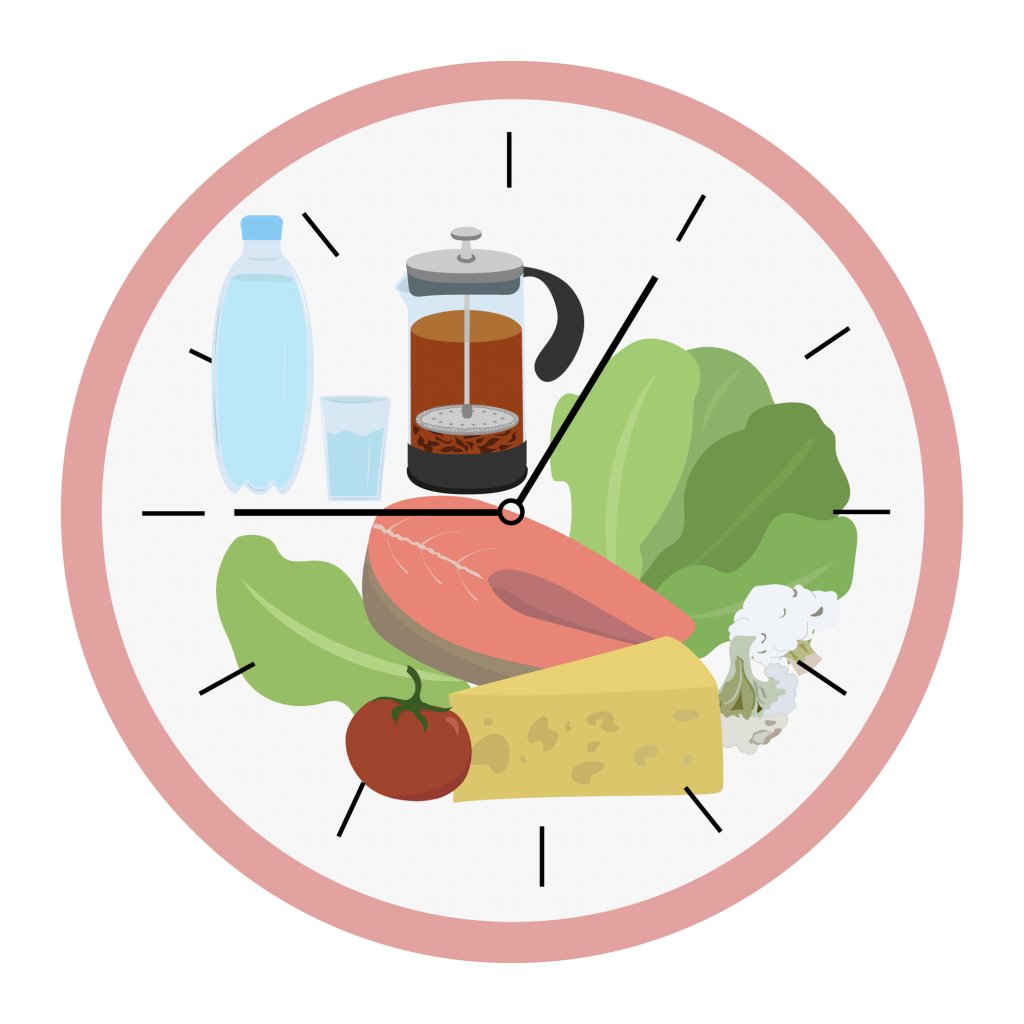
What is Intermittent Fasting?
Intermittent fasting is an eating style that involves alternating between periods of eating and fasting.
Intermittent fasting is not a diet; it’s a lifestyle. You’re in charge of your own meal plan, and you can customize it to your liking. You can combine intermittent fasting with the Mediterranean diet, Paleo, Keto, DASH, or any other diets. If you don’t want to follow a particular diet, just make sure that you make healthy food choices. Try to avoid artificial ingredients or overly processed foods. So long as you meet all your nutritional requirements within your eating window, just about anything goes!
Because you’re not tied down by the restrictions of a traditional diet, you have the freedom to customize your meals to your own preferences. This means that you’re more likely to stick to a consistent diet plan, which is essential if you want to lose weight and keep it off.
Is intermittent fasting healthy?
Although conventional advice would have us believe that we need to eat every 2-3 hours to sustain ourselves, our evolutionary history paints a different picture. Our hunting and gathering ancestors didn’t have regular access to food like we do, so their bodies had to develop a way to operate without a consistent source of glucose. That’s where fasting comes in as a survival mechanism.
In the same way that you might clean your home and throw out the things you don’t need, fasting is our body’s way of cleaning up shop. Fasting for extended periods allows your body to cleanse itself and use up leftover nutrients from the previous day’s meals, which triggers a process called “metabolic switching”.
Metabolic switching slows the aging and disease processes and promotes weight loss in obese individuals. Fasting also prevents breast cancer in both women and men, and studies suggest that it may improve longevity. Eating constantly doesn’t allow the body time to properly rest, which means you won’t experience the cleansing benefits of metabolic switching.
What fasting does to the brain?
Intermittent fasting is amazing for maintaining brain health. In addition to slowing the aging process, metabolic switching increases neuroplasticity in the brain. This helps optimize brain function and increase the brain’s resistance to injury and disease. Intermittent fasting also triggers a process called autophagy, which works to ward off Alzheimer’s disease and Parkinson’s.
Fasting can also clear brain fog and sharpen the mind. Many people who fast report clearer thinking and improved moods, which can benefit your brain-gut connection and increase your overall happiness.
Intermittent Fasting for Beginners
There are a few different ways to practice intermittent fasting.
Some of the most common methods include:
Time-restricted fasting
This is the most common method of fasting, and the one most people will end up practicing. It works by limiting the daily window where you eat your food every day. For example, if you eat your first meal of the day at 10 am and your last meal at 6 pm, then you’ve fasted for 16 hours and eaten for 8, meaning that you followed a 16:8 fasting schedule. Common ratios for time-restricted fasting include 14:10, 16:8, 18:6 and 20:4.
5:2 Fasting
This method of fasting involves eating normally for 5 days a week and fasting for two. On fast days, you’ll eat one 500 calorie meal if you’re a woman, or one 600 calorie meal if you’re a man.
Alternate Day Fasting
This is a more extreme version of 5:2 fasting. Instead of fasting for only two days a week, you’ll fast on alternating days, following the same 500-600 plan for meals on fast days.
Start with time-restricted fasting before trying the more advanced options. Just like you can’t expect to run a marathon without experience, you can’t expect to fast for hours on end without a little training first.
Try gradually shrinking your eating window every day until you’ve reached your goal. If you currently eat your first meal at 8:00 am, try pushing it out to 9:00 am and eventually to 10:00 am or 11:00 am. Or if you want to try 5:2 fasting, start out by fasting only one day a week and gradually upping it to two. Whatever fasting schedule you choose, just try to be consistent. Establishing a routine and sticking to it helps establish consistency, which is key for a healthy lifestyle.
What constitutes breaking a fast?
If you’re interested in giving fasting a try, you might be wondering about what counts as breaking a fast.
Will your morning cup of coffee ruin your fasting schedule or not? The answer is, it depends.
While calorie-free beverages like coffee or tea are all right to drink while fasting, anything that has calories in it breaks a fast. That includes any kind of artificial sweeteners or creamers you may add to your favorite drink.
That doesn’t mean that you have to drink black coffee exclusively, however. You can make a game out of adding creamer to your coffee at a later time every day. Try challenging your family members or friends to see who can hold out with black coffee the longest!
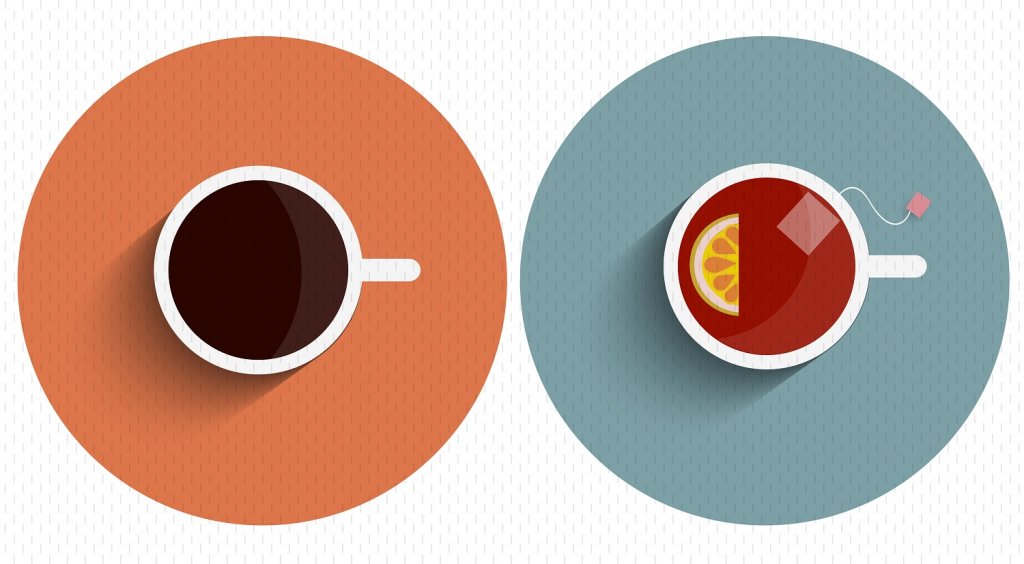
Is there anyone who shouldn’t fast?
People with Type 1 diabetes or anyone who takes insulin shouldn’t fast. This can put you at risk for dangerous blood sugar problems like hypoglycemia or ketoacidosis. People with hypertension, blood pressure problems, or cognitive impairments shouldn’t fast either, and neither should anyone who struggles with remembering to eat on a daily basis.
Certain medications may also prevent people from fasting, and those who use canes or wheelchairs should also take care not to fast. As with any diet, check with your healthcare provider if you’re not sure that fasting is right for you.
Conclusion
The benefits of intermittent fasting are numerous and clear. It can increase your lifespan, lower your risks for diseases and improve your brain’s overall health. But perhaps fasting’s biggest benefit is that it allows you to put the joy back in eating. When you don’t have to worry about weighing, counting or measuring, you can focus on eating foods that nourish not only your body, but also your soul.
You can still indulge in your family’s traditional recipes without feeling guilty. It’s important to eat a balance of foods that make you happy and foods that keep you healthy. Intermittent fasting provides you with the perfect framework for this, allowing you to live your best life possible exactly the way you want to.
DP World’s Aviv Clinics Dubai
Nutrition is an important pillar in your approach to health, especially as you age. The Aviv Medical Program utilizes a multidisciplinary approach to healthy aging, including a personalized nutrition plan based on a comprehensive assessment to address your individual needs and goals, along with hyperbaric oxygen therapy, physical training, and cognitive training.
Discover how you can take your brain health and longevity into your own hands with Aviv Clinics. Learn more today.
Is a Fitness Tracker Right For You? Weighing The Pros and Cons
Fitness trackers are some of the hottest tech gadgets on the market. They can measure your daily steps count, monitor your heart rate, log how many calories you’ve eaten, and even analyze your sleep quality. Some models can read your blood oxygen levels and use GPS technology to keep track of your running, walking, or biking route. Many people swear by making this type of “wearable” technology a part of their daily routines.
But is there any merit to all this hype?
Are fitness trackers a passing trend or a worthy addition to your health and exercise routine?
Why wear a fitness tracker?
We all know that it’s important to exercise regularly, especially as we age. Studies have shown that physical activity can extend longevity, prevent cardiovascular disease and stroke, and combat the onset of dementia. Having a regular exercise routine is an important part of keeping your body feeling young and in shape. The trouble is that many people struggle with keeping up a consistent workout routine. This is where fitness trackers come in.
Fitness trackers are wearable health devices designed to monitor your activity level. They come in all shapes and sizes, from simple models that are little more than glorified pedometers to advanced smartwatches that can track your body’s vital signs in micro detail.
Tracking your fitness activity also can be an important step to taking charge of your health because it makes people more conscious of their health. Having a log of your activity level and vital signs can also be a valuable tool to share with your doctor or personal trainer. Seeing hard data makes it easier to create a sustainable routine you can stick to. Aviv Clinics clients receiving the innovative hyperbaric oxygen therapy treatment use apps and other such technology to stay on track with their customized brain and physical training, plus nutritional coaching plan.
![]()
The Pros of Using a Fitness Tracker:
1. Helps build routine
For many people, blindly exercising without any way to track their progress can be frustrating. It can be hard to find the motivation to get moving when you have no way of knowing if your efforts are working. Wearing a fitness tracker allows you to see your progress in real-time and make adjustments. If you track 5,000 steps a day, you can make it a goal to gradually increase to the recommended 10,000 steps per day. It can be motivating to see your numbers improve, which makes it easier to stick to your routine.
2. Motivates you to move more
Most of us spend far more time than we’d like to on the couch. Sitting too much can be deadly. It’s a good rule of thumb to get up and move for 15 minutes for every hour that you spend sitting down. Many fitness trackers come with built-in reminders for this exact reason, helping you remember to get up and move throughout the day.
3. Keeps track of your dietary choices
Many fitness trackers offer ways to input your daily food and water intake via the connected apps. Keeping track helps make sure that you’re getting adequate nutrition. Studies have shown that tracking your food intake can lead to weight loss, even without following a specific diet plan. The information can also help a dietitian or a personal trainer get an idea of your daily meal plan. They can use this data to help you formulate a healthy diet, and logging your choices regularly can help you stick to it.
The cons of owning a fitness tracker:
1. Can be overwhelming
Some people may find the amount of data to be overwhelming. Many devices offer far more options than the average person needs, and the high cost of some premium models means they may not be an ideal investment. Those who are less technically savvy may also find the device’s smartphone app frustrating to use, or simply not worth the trouble.
Ask yourself what’s most important to you to keep track of — such as your heart rate, number of steps and estimated number of calories burned — then look for models that only track those features. You’ll save money and save your brain from information overload.
2. May lead to obsessive behavior
The detailed stats that a fitness tracker provides can be a tremendous motivation for some people. But for others, this may open a gateway to obsessive behavior. Many people can’t help but fixate on obtaining perfect stats, and may push themselves too hard to achieve them. The number on the screen is only a best estimation of your daily activity, not a measure of your self-worth! It’s also worth noting that fitness trackers are not medically accurate with their stats, and there can be vast discrepancies between different models.
3. Not as useful in the long-run
While a fitness tracker can be a valuable tool to motivate you in the early stages of your fitness journey, they’re not as useful for keeping the weight off in the long-run. Surveys have shown that around ⅓ of people who buy fitness trackers stop wearing their devices after six months. Other studies have found that they’re not as helpful for losing weight as most people would believe. A randomized trial by the Journal of American Medicine found that people who didn’t wear a fitness tracker actually lost around 8 pounds more on average compared to their device-wearing counterparts.
Does that mean that wearing a fitness tracking device will inhibit your progress? Not necessarily. Those in the study who wore the trackers still saw improvements to their body composition and physical fitness thanks to their new diet and exercise routines. That’s because the trick to living a healthy lifestyle is finding a routine that works and sticking to it. If the fitness tracker helps you do this, excellent! If not, another method of motivation might be better for you.
The best alternatives to fitness trackers:
It’s worth noting that shelling out hundreds of dollars for a fitness tracker isn’t the only way to monitor your health. If you want to get an idea of what your heart rate is like while exercising, try this simple experiment: go for a brisk 30-minute walk around your neighborhood. When you get to the halfway point, try singing one of your favorite songs. If you can sing it perfectly without any hesitation, up the pace.
You can also set “stand up and move” reminders on your watch or smartphone. For tracking your food intake, there are a number of apps available to let you log your daily meals. Some people enjoy keeping a physical food journal rather than going with a purely digital route. You can always experiment until you find the right method.
The Bottom Line
When used correctly, a fitness tracker can be a helpful tool that offers detailed feedback on your body’s activity level and other aspects of your health. If you need an extra boost to get moving or want to keep a close eye on your progress, they can be a worthwhile investment. However, if you have a tendency to obsess over small details or don’t need the extensive data that a fitness tracker provides, another option might be better to track your progress. Ultimately, how you choose to track your activity is your choice. Whatever option you choose, the important thing is that you keep moving and stay active at a healthy level.
Aviv Clinics delivers a highly effective, science-based treatment protocol to enhance brain performance and improve the cognitive and physical symptoms of conditions such as traumatic brain injuries, fibromyalgia, Lyme, and dementia.
Our intensive treatment protocol uses Hyperbaric Oxygen Therapy and cognitive and physical training as well as nutrition management for better brain health. The medical program closely tracks clients’ progress before, during, and after the treatment protocol, using customized tablets and other technology. Based on over a decade of research and development, the Aviv Medical Program is holistic and customized to your needs.